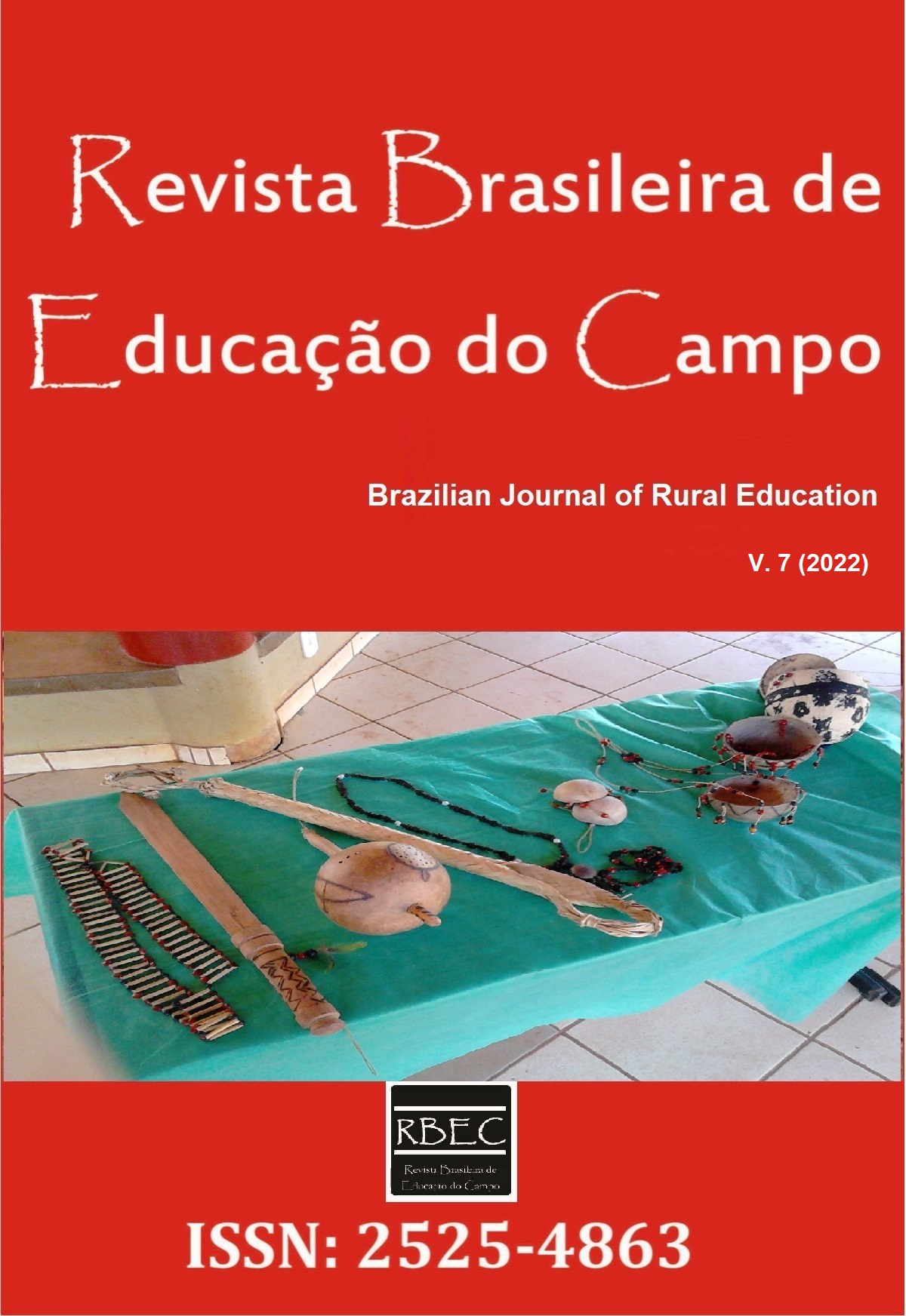The “state of the art” of teaching in Rural Extension in Brazil
DOI :
https://doi.org/10.20873/uft.rbec.e14747Résumé
ABSTRACT. This article aims to carry out an analysis of the "state of the art" of teaching in Rural Extension in Brazil, considering the panorama of the offer of the discipline, current academic trends and the profile of teachers, comparing data from surveys carried out in 2008, 2010 and 2022 based on the Forum that brings together Rural Extension teachers. The research is qualitative-quantitative in nature and at a descriptive level. Data from 2008 and 2010, published in research reports, serve as a comparison for data collected through an electronic form with 49 Rural Extension teachers from a universe of 136 teachers from all regions of the country. The results point to evidence in the discipline such as: trend of change in nomenclature; theoretical and practical offer; taught as compulsory in courses in Agricultural Sciences and as optional in some courses in Human and Social Sciences; offered in the final semesters of graduation. The profile of the professors who teach the discipline can be summarized as: experienced (majority with more than 5 years of teaching experience), qualified (professors with a PhD), active in addition to teaching, also in research and university extension, articulated with a diversity of issues of interest to Rural Extension and increasingly integrated into postgraduate.
Téléchargements
Références
Brasil. Lei n. 12.188, de 11 de janeiro de 2010. (2010, 12 de janeiro). Institui a Política Nacional de Assistência Técnica e Extensão Rural para a Agricultura Familiar e Reforma Agrária - PNATER e o Programa Nacional de Assistência Técnica e Extensão Rural na Agricultura Familiar e na Reforma Agrária - PRONATER, altera a Lei no 8.666, de 21 de junho de 1993, e dá outras providências.
Callou, A. B. F., Pires, M. L. L. S., Leitão, M. R. F. A., & Santos, M. S.T. (2008). O estado da arte do ensino da Extensão Rural no Brasil: relatório de pesquisa. Recife, PE: Gráfica Artimpresso.
Caporal, F. R., & Costabeber, J. A. (2002). Construindo uma Nova Extensão Rural no Rio Grande do Sul. Agroecologia e Desenvolvimento Rural Sustentável, 3(4), 10-15.
Caporal, F. R., & Costabeber, J. A. (2004). Agroecologia e Extensão Rural: contribuições para a promoção do desenvolvimento rural sustentável. Brasília, DF: MDA/SAF/DATER/IICA.
Diesel, V., & Dias, M. M. (2010). Fundamentos teórico-metodológicos da Extensão Rural: quais fundamentos? In Anais do 2º Seminário Nacional de Ensino em Extensão Rural. Santa Maria, RS. Recuperado de: http://w3.ufsm.br/seminarioextensaorural/arqs/Fundamentos_Teorico-metodologicos_em_extensao_rural.pdf
Duarte Filho, J. R. (1996). Historicidade da disciplina de Extensão Rural. Extensão Rural, (3), 15-22. Recuperado de https://periodicos.ufsm.br/extensaorural/article/view/6118
Freire, P. (1983). Extensão ou comunicação? Rio de Janeiro, RJ: Editora Paz e Terra.
Leal, M. G. S. F., & Braga, G. M. (1997). A formação de profissionais para a Extensão Rural: um recorte no estudo de projetos políticos para a modernização da agricultura e da educação no Brasil. Revista de Economia e Sociologia Rural, 35(1), 119-137.
Ministério da Educação. (2006a). Resolução Nº 1, de 2 de fevereiro de 2006. Institui as Diretrizes Curriculares Nacionais para o curso de graduação em Engenharia Agronômica ou Agronomia e dá outras providências. Recuperado de: http://portal.mec.gov.br/cne/arquivos/pdf/rces01_06.pdf
Ministério da Educação. (2006b). Resolução Nº 3, de 2 de fevereiro de 2006. Institui as Diretrizes Curriculares Nacionais para o curso de graduação em Engenharia Florestal e dá outras providências. Recuperado de: http://portal.mec.gov.br/cne/arquivos/pdf/rces03_06.pdf
Ministério da Educação. (2006c). Resolução Nº 5, de 2 de fevereiro de 2006. Institui as Diretrizes Curriculares para o curso de graduação em Engenharia de Pesca e dá outras providências. Recuperado de: http://portal.mec.gov.br/cne/arquivos/pdf/rces05_06.pdf
Ministério da Educação. (2006d). Resolução Nº 4, de 2 de fevereiro de 2006. Aprova as Diretrizes Curriculares Nacionais para o curso de graduação em Zootecnia e dá outras providências. Recuperado de: http://portal.mec.gov.br/cne/arquivos/pdf/rces04_06.pdf
Silva Neto, B. (2010). Por uma Agronomia como uma ciência da complexidade: o papel da disciplina de Extensão Rural. In Anais do 2º Seminário Nacional de Ensino em Extensão Rural. Santa Maria, RS. Recuperado de: http://w3.ufsm.br/seminarioextensaorural/arqs/Texto_Benedito_Silva_Neto.pdf
Wizniewsky, J. G., Poerschke, C.S., Moraes, C.S., Vargas, D. L., Silva, D. F., Murad, G., Oliveira, G. N., Friedrich, G. N., Reys, M. A., Neumann, P. S., & Diesel, V. (2010). O Estado da arte do ensino em Extensão Rural no Brasil: relatório de pesquisa. Santa Maria, RS.
Téléchargements
Publié-e
Comment citer
Numéro
Rubrique
Licence
© Daiane Loreto de Vargas, Laila Mayara Drebes 2022

Cette œuvre est sous licence Creative Commons Attribution 4.0 International.
Proposal for Copyright Notice Creative Commons
1. Policy Proposal to Open Access Journals
Authors who publish with this journal agree to the following terms:
A. Authors retain copyright and grant the journal right of first publication with the work simultaneously licensed under the Creative Commons Attribution License that allows sharing the work with recognition of its initial publication in this journal.
B. Authors are able to take on additional contracts separately, non-exclusive distribution of the version of the paper published in this journal (ex .: publish in institutional repository or as a book), with an acknowledgment of its initial publication in this journal.
C. Authors are permitted and encouraged to post their work online (eg .: in institutional repositories or on their website) at any point before or during the editorial process, as it can lead to productive exchanges, as well as increase the impact and the citation of published work (See the Effect of Open Access).














